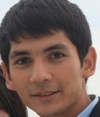 Economics/Leadership/Responsible Development/Stability
Economics/Leadership/Responsible Development/Stability
As a young citizen of a landlocked country surrounded by landlocked countries all ending with stan, Behruz Khalikov was among those most eager to attend HSI this summer. Conflict has severely affected his country and the surrounding region where ethnic clashes loom and tensions are high. In June of 2010, attacks in southern Kyrgyzstan targeted the local Uzbek diaspora in the worst violence since 1990. Hundreds of people were killed as organized gangs of Kyrgyz raided ethnic Uzbek neighborhoods, setting homes and businesses ablaze and killing families. “Thousands were wounded or displaced, according to international news sources, such as The Economist,” Behruz says. Subsequent investigations revealed that political fanaticism had exploited ethno-nationalism.
The current governments have yet to adequately address these problems, and Behruz believes that he and other youth leaders need to come forward to help establish a safer world. He wants to hear what young leaders in other countries have to say about terrorism, corruption, unemployment, and poverty. For his part, he vowed to “use every single opportunity to learn more about conflict resolution, international cooperation, and diplomacy” and return home from HSI with a fresh outlook, equipped with new techniques, especially those practices that have already brought peace to other countries.
“I am not sure that you are familiar with Kelajak Ovozi, but let me introduce you to it,” he says. “It is the biggest youth movement in my country that enables young people to develop and discover their potential.” Its goal is to develop future leaders, provide them with work experience, and create projects offering leadership positions as well as grants, certificates, and opportunities. As a member of Kelajak Ovozi, Behruz has assumed leadership positions at both local and national levels.
Enrolled in the University of World Economy and Diplomacy, he became chairman of the Kelajak Ovozi Student Committee, guiding more than thirty students. Responsibilities presented themselves quickly, teaching Behruz to delegate duties and ensure their timely completion. Stressful situations taught him to find efficient solutions to various crises. By discovering the group’s unique interests, he learned how to motivate members to work toward a common goal. For instance, the group formed a Global Perspective Club to mediate between students and the university staff concerning student conferences and activities. The new club wanted to attract more students and was able to rally them based on their common interests.
“My motto is: there is no I in team,” Behruz says, adding that team members should support each other. A leader listens to others’ ideas and provides extra help if needed, all to promote team stability, confidence, and enthusiasm.
As a major in economics, Behruz was called “Money Guy” by friends. Before HSI, he aimed to get his MBA and work in top level management for an international company involved with trades or insurance. However, HSI “has changed my vision of the world completely.” He feels more responsibility for the future of his country “and entire world as well.” As a local leader, he would work to make communities more peaceful and build prosperity with concern for future generations. Behruz would consider representing his country in the UN where he might attract international associations to settle different kinds of conflicts as they erupt and work to make Central Asia more stable and peaceful, especially Afghanistan. Behruz would also be interested in working with the World Bank where he envisions equitable allocations of resources at the heart of conflicts.
Uzbekistan is now involved in the process of globalization. Since gaining independence and joining the UN in 1992, Uzbekistan has started to build friendly relationships with other countries with intentions of contributing to stability and making peace in the world. Behruz will undoubtedly be a part of that evolving vision.
